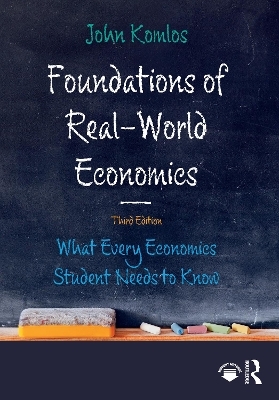
Foundations of Real-World Economics
Routledge (Verlag)
978-1-032-00172-2 (ISBN)
The 2008 financial crisis, the rise of Trumpism, and the other populist movements which have followed in their wake have grown out of the frustrations of those hurt by the economic policies advocated by conventional economists for generations. Despite this, textbooks remain frozen in time, continuing to uphold traditional policies as though nothing has happened.
Foundations of Real-World Economics demonstrates how misleading it can be to apply oversimplified models of perfect competition to the real world. The math works well on college blackboards but not so well on the Main Streets of America. This volume explores the realities of oligopolies, the real impact of the minimum wage, the double-edged sword of free trade, and other ways in which powerful institutions cause distortions in mainstream models. Bringing together the work of key scholars like Kahneman, Minsky, and Schumpeter, this textbook takes into consideration the inefficiencies that arise when the perfectly competitive model is applied to the real world dominated by multinational oligopolies. The third edition has been updated throughout, bringing in new material on the financial crises, the rise of populism, racism, inequality, climate change, and the Covid-19 pandemic.
A must-have for students studying the principles of economics as well as micro- and macroeconomics, this textbook redresses the existing imbalance in economic teaching as John Komlos focuses on the paradigm of humanistic economics.
John Komlos is Professor Emeritus of Economics and of Economic History at the University of Munich, Germany. He has also taught at universities such as Harvard, Duke, UNC-Chapel Hill, the University of Vienna, and the Vienna School of Economics and Business. In 2003, Komlos founded the field of Economics & Human Biology with the journal of the same name, and through his research realized the limitations of conventional economic theory and has been an ardent advocate of humanistic economics.
1. Welcome to Real-World Economics 2. The Evidence: Markets Are Neither Omniscient Nor Omnipotent 3. The Nature of Demand 4. Homo Oeconomicus Is Extinct: The Foundations of Behavioral Economics 5. Taste-Makers and Consumption 6. Oligopolies and Imperfect Competition 7. Returns to the Factors of Production 8. The Case for Oversight, Regulation, and Management of Markets 9. Microeconomic Applications On and Off the Blackboard 10. What Is Macroeconomics? 11. Macroeconomics Part II 12. Macroeconomics Part III 13. The Tsunami of Globalization 14. The Financial Crisis of 2008 15. Economists’ Mistakes Lead to Right-Wing Populism and an Insurrection 16. Hidden Racist Elements in Blackboard Economics 17. The Covid-19 Pandemic Exposed the Need for a Black-Swan-Robust Economy 18. Conclusion: Toward a Capitalism with a Human Face
| Erscheinungsdatum | 03.03.2023 |
|---|---|
| Zusatzinfo | 34 Tables, black and white; 102 Line drawings, black and white; 24 Halftones, black and white; 126 Illustrations, black and white |
| Verlagsort | London |
| Sprache | englisch |
| Maße | 178 x 254 mm |
| Gewicht | 780 g |
| Themenwelt | Geschichte ► Teilgebiete der Geschichte ► Wirtschaftsgeschichte |
| Wirtschaft ► Allgemeines / Lexika | |
| Wirtschaft ► Volkswirtschaftslehre ► Wirtschaftspolitik | |
| ISBN-10 | 1-032-00172-0 / 1032001720 |
| ISBN-13 | 978-1-032-00172-2 / 9781032001722 |
| Zustand | Neuware |
| Informationen gemäß Produktsicherheitsverordnung (GPSR) | |
| Haben Sie eine Frage zum Produkt? |
aus dem Bereich


